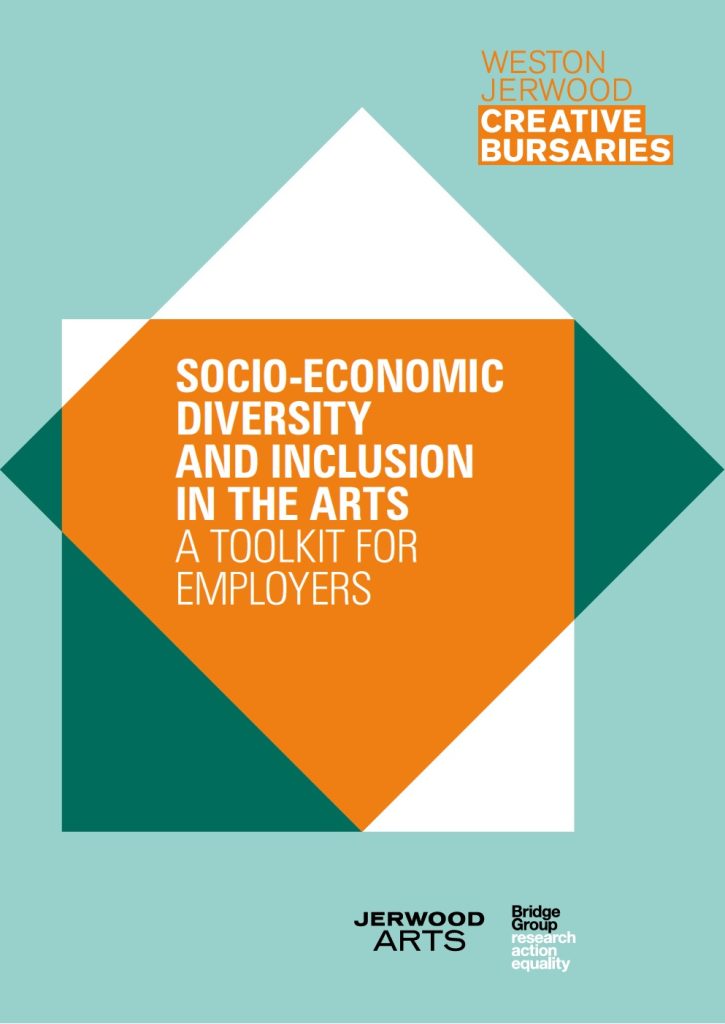Socio-economic Diversity and Inclusion in the Arts: A Toolkit for Employers is published by Jerwood Arts and the Bridge Group. It draws on the Weston Jerwood Creative Bursaries programme’s decade of working with employers and influential research by the Bridge Group on increasing socio-economic diversity in the workplace and fostering inclusive and enabling organisational cultures.
The guide, which features case studies from arts employers, argues that socio-economic background should be given the same consideration as ethnicity, disability, gender and other ‘protected characteristics’ which are legally protected from discrimination.
Its five key recommendations call on employers to:
- Measure and publish information on socio-economic diversity, with occupation of parents when the applicant was 14 years old recommended as the key indicator and full guidance on how to collect and analyse the relevant data.
- Reflect on use of key terms like ‘talent’ and ‘merit’ – and avoid reference to potentially alienating words such as ‘disadvantage’ and ‘privilege’.
- Create more inclusive work cultures, for example by ending ‘informal sponsorship’ and considering specific support needs that those from lower socio-economic backgrounds might have.
- End unpaid and unadvertised work opportunities, with payment recommended for any work period over four weeks.
- Reform recruitment processes, for example by inviting candidates to reflect on their professional and personal journeys and any obstacles or barriers they have experienced.
The guide focuses specifically on socio-economic background but also explores the ways in which socio-economic background can intersect with protected characteristics including gender, ethnicity and disability.
The Toolkit urges employers to take a strategic rather than piecemeal approach to levelling the playing field for people from low income backgrounds and aims to go beyond merely promoting the social mobility of individuals to putting the onus on employers to create sustainable institutional change within their organisations.
Jerwood Arts Director Lilli Geissendorfer said:
“Evaluation of our work has given us a unique view on what does and doesn’t work in recruiting those from lower socio-economic backgrounds, and the Toolkit shares what we now know. We hope it will help anyone with the power to appoint and promote to make strategic changes to embed inclusive practices, and make the arts more excellent for all.”
Darren Henley, Chief Executive of Arts Council England, one of the main funders of the Weston Jerwood Creative Bursaries programme 2017-19, said: “We want to make sure that the people who create artistic work and run cultural organisations are representative of the way that England looks and feels today – and the same is true for audiences too. Our investment in this new toolkit is a step in helping this to happen – but there is still much to do.”
Nik Miller, Chief Executive of the Bridge Group, added: “Of all sectors, the arts must be where diversity and inclusion should be taken most seriously. Works that explore, challenge and reflect contemporary society are naturally richer if they are informed by a wider range of social perspectives and experiences. We hope this guide supports organisations and individuals to make another important step in this direction.”
Launch of the Toolkit at Manchester International Festival coincides with publication of the evaluation of the third edition of the Weston Jerwood Bursaries Creative Bursaries (see Notes to Editors) and will be followed in the autumn by a series of workshops exploring the Toolkit recommendations in detail.
The first event will take place at Dance4 in Nottingham on Tuesday 15th October from 12-4pm. Please follow this link to book a free place: www.eventbrite.co.uk/e/socio-economic-diversity-and-inclusion-in-the-arts-workshop-tickets-64228321639. Further dates and venues will be announced shortly.
You can download the Toolkit here.
Read more about the Weston Jerwood Creative Bursaries here.
Read the press release here
